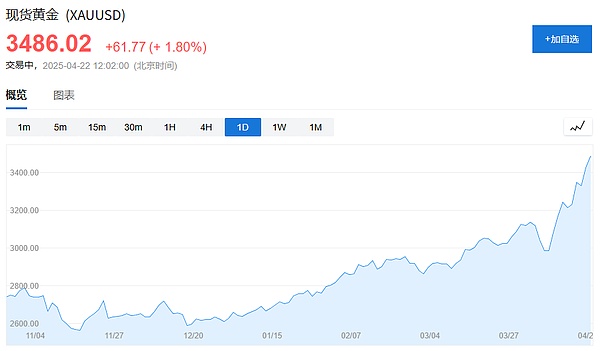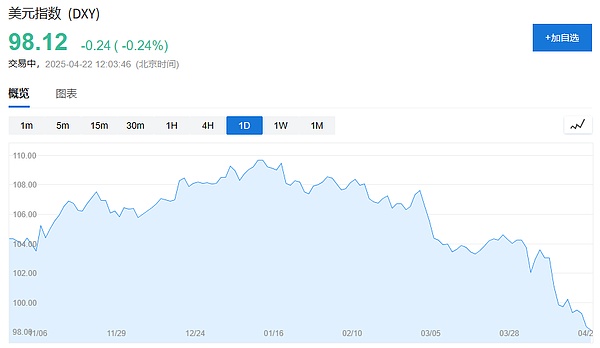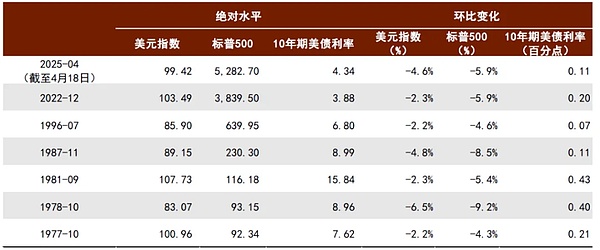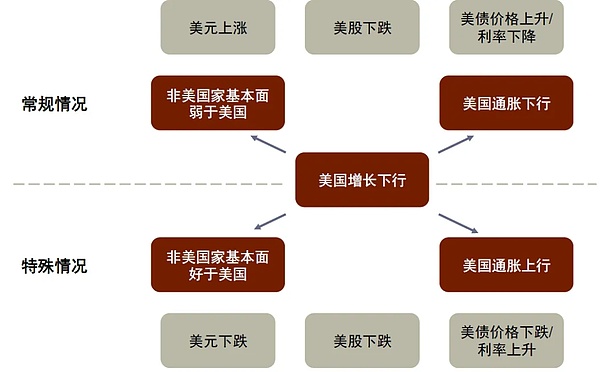Source: Wall Street Journal
According to CCTV News, the "tariff war" that Trump originally hoped to resolve quickly has evolved into a "protracted war", and Trump is extremely anxious.
Now, many economic indicators show that these tariff policies may push the United States and even many parts of the world to the brink of recession, and the capricious "tariff war" has not only failed to overwhelm other countries, but has put American companies and people under tremendous pressure.
Asset management giants warned that if the current high tariff policy continues to exist, the United States will "definitely" fall into an economic recession in 2025.
Against this background, US President Trump, who had just said that "the United States is not in a hurry", once again blasted Federal Reserve Chairman Powell, and once again demanded an immediate interest rate cut, otherwise it would harm the economy.
This has exacerbated investors' concerns about the independence of the Federal Reserve and the economic outlook. U.S. assets repeated the "triple kill" of stocks, bonds and currencies on Monday. The Nasdaq fell nearly 4% at one point, and the price of gold soared to a new high of $3,486 per ounce.

The U.S. dollar index fell to around 98, a new low in the past 16 months. With just over a week left this month, the U.S. dollar index is about to record its worst monthly performance since the Fed's QE in 2009.

According to a report by CICC, the "triple kill" of U.S. stocks, bonds and currencies is relatively rare in history. From January 1971 to the present, there have been only six months in which U.S. stocks, bonds and currencies have fallen significantly at the same time.

If the U.S. stocks, U.S. bonds and the U.S. dollar do not change significantly in April, April 2025 will be the seventh month since 1971 in which U.S. stocks, bonds and currencies have all experienced significant declines.
01 Giant warns: If high tariffs continue, the United States will definitely fall into recession in 2025
Torsten Slok, chief economist of Apollo Global Management, said in an interview with CNBC on Monday that if the current high tariff level remains unchanged, the United States will fall into recession in 2025. "It all depends on whether the tariffs remain at these levels. If they remain at these levels, we will definitely fall into recession in 2025."
Slok predicts that if the high tariff policy continues to be effective, the probability of the US economy shrinking for two consecutive quarters is as high as 90%, and the gross domestic product will fall by 4 percentage points.
This grim forecast far exceeds the pessimistic expectations of other Wall Street institutions, such as David Kelly of JPMorgan Asset Management's previous forecast of a 60% recession probability.
Apollo data shows that it takes the United States an average of 18 months to complete a trade agreement negotiation.
While the United States is negotiating trade with 90 countries at the same time, global trade is stagnating, with problems similar to those during the COVID-19 pandemic: intensified supply chain challenges could lead to shortages in U.S. stores within weeks, rising U.S. inflation, and reduced travel to the United States.
According to Apollo research, if current policies remain unchanged, the U.S. economy could face a so-called "voluntary trade reset recession" (VTRR), with a probability of up to 90%.
02 Trump blasts Powell again: Big loser, cut interest rates now, otherwise it will hurt the economy
On Monday, April 21, Eastern Time, Trump mentioned Powell, whom he nicknamed "Too Late", again in a social media post, reiterating that domestic inflation in the United States is minimal.
According to the Securities Times, Trump said in the post that U.S. economic growth may slow unless interest rates are cut.
Trump's post reads:
"Many are calling for 'preemptive rate cuts.' With energy costs falling sharply, food prices (including Biden's egg disaster!) falling sharply, and most things trending down, there is virtually no inflation."
The above costs are falling as he expected, "there will be little inflation, but the economy may slow unless 'Mr. Too Late' (Powell), the big loser, lowers interest rates now."
Trump then mentioned that the European Central Bank has cut interest rates seven times. Powell's previous actions were always "too late", except during the US presidential election, when it was to help Democratic President Biden and Vice President Harris get elected.
Analysts say that Trump's implication is that the Federal Reserve has been politicized as an institution and is willing to help the Biden administration but is unwilling to provide the same support to him.
And these remarks also reinforce Trump's long-standing view that the Fed should be more responsive to the president's wishes. In the future, he is likely to try to undermine the legitimacy of the Fed as an independent institution, thereby undermining the effectiveness of its policies.
Following last Thursday and Friday, this is the third day that Trump publicly called on Powell to cut interest rates after the ECB's recent rate cuts.
Wall Street Journal mentioned that last Thursday, the ECB decided to cut interest rates at its seventh meeting since June last year. On the same day, Trump named Powell three times through social media and public speeches. He first posted on the social platform that Powell "should leave as soon as possible", and later said that he was very dissatisfied with Powell. The only good thing he could do was to cut interest rates. If Europe cuts interest rates and the Fed does nothing, it will put the United States at a disadvantage.
Trump also hinted that he has the ability to fire Powell, saying that he can let Powell go immediately and ask the Fed to cut interest rates immediately, which has caused public controversy.
Last Friday, Trump once again called on Powell to lower interest rates and downplay concerns about inflation at an event at the White House. Trump also said that if we have a Fed chairman who knows what he is doing, interest rates will go down, and he should bring them down.
On the same Friday, when asked by reporters whether there is an "unprecedented option" to fire Powell, Trump's chief economic adviser and director of the White House National Economic Council, Hassett, replied that Trump and his team are studying the issue, and hinted that the Fed's rate hikes and rate cuts under Powell's leadership have political tendencies that favor the Democratic Party.
Nick Timiraos, a senior Fed reporter known as the "New Fed News Agency," believes that Trump's renewed call for an immediate rate cut is to mitigate the possible impact of the trade war.
03 Rare triple kill of U.S. stocks, bonds and currencies: only 6 times since 1971
The CICC report pointed out that since the United States imposed tariffs, the U.S. dollar has not strengthened, but has experienced a "triple kill" of stocks, bonds and currencies, which is relatively rare in history.
Since April, the US dollar index has fallen by 5%, the S&P 500 index has fallen by 6%, and the 10-year US Treasury bond rate has risen by 11 basis points (US Treasury bond prices have fallen).
From January 1971 to now, there have been only six months in which US stocks, bonds and currencies have fallen significantly at the same time. If US stocks, US bonds and the US dollar do not change significantly in April, April 2025 will be the seventh month since 1971 in which US stocks, bonds and currencies have fallen significantly.

Generally speaking, the decline of US stocks, the rise of US bonds and the rise of the US dollar are asset changes that investors are more adapted to. However, if the United States faces the risk of "stagflation" and other economies can rely on "non-US" forces to support the fundamentals, then there is a possibility of a triple kill of US stocks, bonds and currencies.
This situation is directly reflected in the double kill of stocks and bonds in December 2022 (especially in the second half of the month). At that time, U.S. Treasury yields rose, and overly tight monetary policy exacerbated market concerns about recession, so U.S. stocks fell. While pricing in U.S. "stagflation", the fundamentals of the European and Japanese economies were better than expected, causing the U.S. dollar to depreciate against the euro and the yen.
CICC believes that the mechanism revealed by the above chart can help us understand this time's triple kill of stocks, bonds and currencies in the United States: From a fundamental perspective, the market is pricing in "U.S. stagflation" and a "not-so-bad euro zone."
 Kikyo
Kikyo






